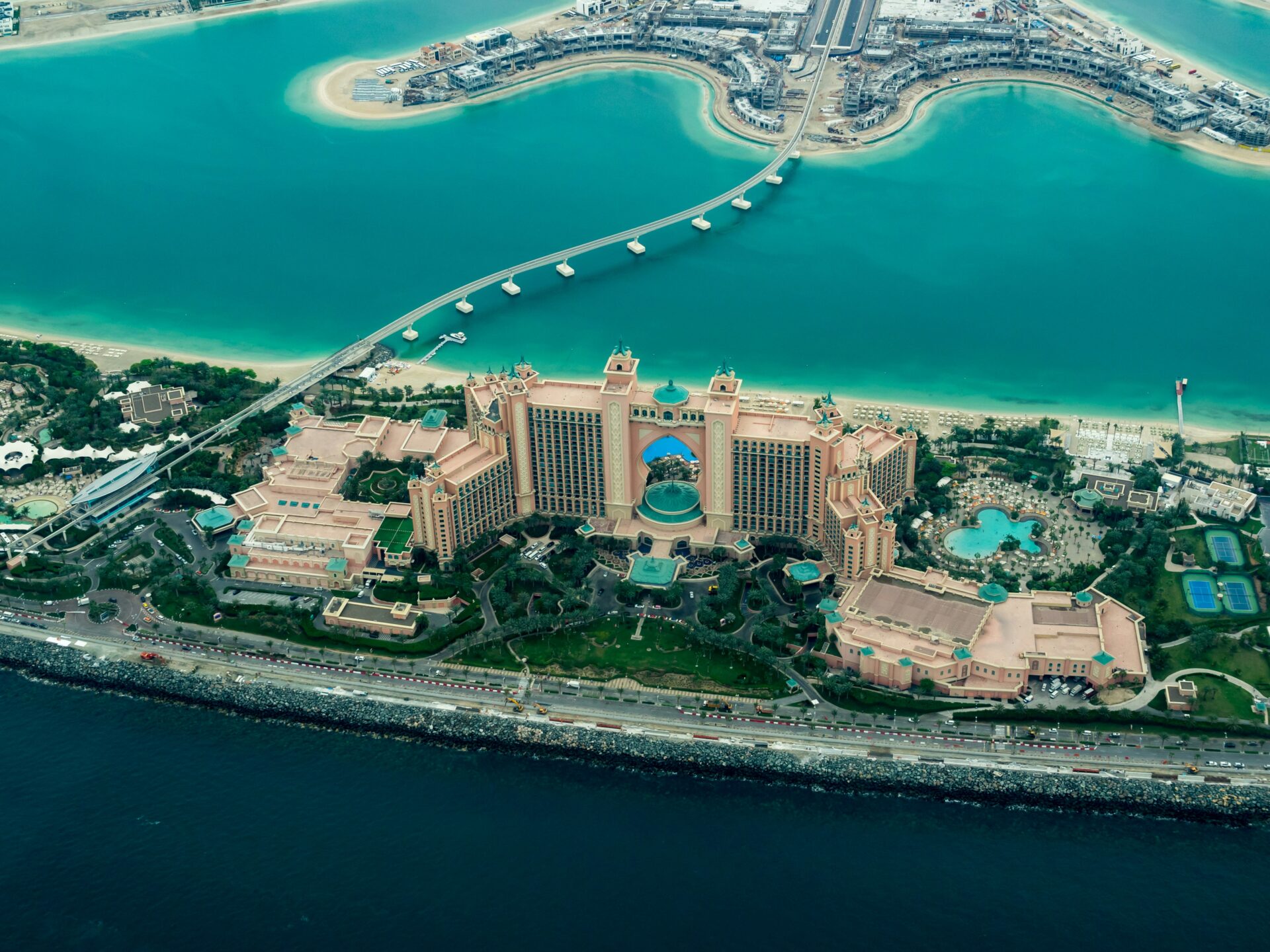How to Start a Real Estate Business in Dubai in 2025
If you’re considering launching a business in the UAE, starting a real estate business in Dubai offers a compelling opportunity. Dubai boasts impressive infrastructure, a strategic location, stunning skylines, robust trading prospects, a thriving tourism industry, and attractive tax policies, making it an ideal destination for investment. The city has evolved into a global hub for foreign investments, showcasing iconic landmarks such as the Burj Khalifa and Marina101.
Table of Contents
ToggleDubai’s property market is characterized by rapid growth, promising excellent returns on investment. Moreover, the real estate sector distinguishes itself with efficient e-Government services. These online platforms facilitate seamless processes for certification, acquiring licenses, processing payments, and issuing visas, simplifying the administrative procedures associated with establishing a real estate business in Dubai. In this article, we explore the costs associated with setting up a real estate business in Dubai. Join us as we delve into the journey of establishing your own real estate enterprise in this dynamic and thriving city.
What Are the Eligibility Conditions to Start Your Real Estate Business in Dubai?
The eligibility criteria for starting a real estate business in Dubai are reasonably flexible. Here are the details:
Age Requirement: Individuals must be at least 21 years old to apply for a permit to operate a real estate business in Dubai.
For Those Below 21: If you are under 21 years old, you can still participate as a shareholder in a real estate business with the consent of a guardian. Approval from the relevant authorities in Dubai is also necessary.
Before pursuing your business ambitions in Dubai’s real estate sector, ensure that you fulfill these criteria.
Read Article: Dubai Mainland Business Setup: Balancing Cost and Strategic Growth
What Licenses Are Required to Start a Real Estate Business in Dubai?
Certainly! Here’s a more detailed explanation of the licenses required for starting a Real Estate Business in Dubai:
1. Real Estate Brokerage License:
– This license allows you to act as a broker in real estate transactions, including buying, selling, or leasing properties on behalf of clients.
– Requirements often include having a physical office space in Dubai, employing qualified real estate agents, and demonstrating financial stability.
– The license is issued by the Dubai Economic Department (DED) or the Real Estate Regulatory Authority (RERA).
2. Real Estate Developer License:
– If you plan to undertake property development projects and sell properties, you need a Real Estate Developer License.
– Requirements typically include submitting a detailed project plan, financial feasibility study, and proof of capability to complete the project.
– The license is issued by RERA after thorough scrutiny of the proposed development.
3. Real Estate Valuation License:
– This license allows you to provide property valuation services in Dubai.
– Requirements include having qualified and certified valuers on staff, demonstrating compliance with valuation standards, and adhering to regulatory guidelines.
– The license is issued by RERA or the Dubai Land Department (DLD).
4. Real Estate Management License:
– If your business involves managing properties on behalf of owners, you need a Real Estate Management License.
– Requirements include having a physical office in Dubai, employing qualified property managers, and demonstrating capability to handle property management tasks.
– The license is issued by RERA or the DLD.
5. Real Estate Investment Promotion License:
– This license is required if you plan to promote real estate investment opportunities in Dubai.
– Requirements often include demonstrating knowledge of Dubai’s real estate market, complying with advertising regulations, and disclosing investment risks.
– The license is issued by RERA or the DLD.
6. Other Permits and Approvals:
– Depending on your specific business activities, you may need additional permits or approvals.
– For example, if your business involves leasing residential properties, you may need a Ejari registration (tenancy contract registration).
– Consultation with legal advisors or business consultants is recommended to ensure compliance with all regulatory requirements and to facilitate a smooth licensing process.
Navigating the licensing process in Dubai can be complex, and regulations may evolve. It’s crucial to stay updated with the latest requirements from RERA, DLD, and other relevant authorities. Seeking professional guidance can help ensure that your real estate business starts off on the right foot and operates legally in Dubai’s dynamic market.

What Are the Legal Requirements and Documents That You Should Prepare to Register for Real Estate Business in Dubai?
When starting a Real Estate Business in Dubai, it’s essential to be prepared with the necessary documents and comply with legal requirements. Here’s a detailed list of the requirements:
1. Police Clearance Certificate:
- The owner of the company must provide a Police Clearance Certificate from the Dubai Emirate Police.
- This certificate confirms that the owner has no criminal record in Dubai.
2. DED Approval (Initial Approval):
- Obtaining Initial Approval from the Dubai Economic Department (DED) is the first mandatory step.
- This approval signifies the DED’s consent for establishing the business in Dubai.
3. Office Requirements:
- All businesses in Dubai, including real estate businesses, must have a physical office space.
- The office location must comply with DED regulations and can be either leased or owned.
4. Documents for Initial Approval in DED:
- Passport: Passport copies of the company’s owner and manager. In some cases, the owner and manager may be the same person.
- Residency Status Information:
For newcomers: Copy of the passport page with details of the last UAE border crossing.
For long-term residents: Copies of Emirates ID and residency visa.
No Objection Certificate (NOC): If the owner or manager already holds a UAE residency visa sponsored by another entity, a NOC from the current visa sponsor is required. - Company Name: Prepare several proposed company names that meet DED requirements. The names should be unique and conform to DED guidelines.
These documents and approvals are crucial for initiating the process of establishing a real estate business in Dubai. It’s advisable to work closely with a business consultant or legal advisor who specializes in Dubai’s regulatory framework to ensure all documents are prepared correctly and all requirements are met. This approach will help streamline the setup process and ensure compliance with local laws and regulations.
Calculate your business setup cost today.
How to Start Real Estate Business in Dubai, UAE?
Certainly! Here is a detailed guide on how to start a real estate business in Dubai, covering each step thoroughly:
1. Craft a Business Plan
A well-developed business plan is crucial for outlining your real estate venture’s goals, strategies, financial projections, and operational structure. Include the following in your plan:
- Company Goals: Define short-term and long-term objectives.
- Target Market: Identify your target clients (e.g., residential, commercial, luxury).
- Marketing Strategy: Outline how you will market properties and attract clients.
- Financial Projections: Estimate startup costs, revenue forecasts, and break-even analysis.
- Operational Structure: Detail roles and responsibilities within the company.
- SWOT Analysis: Assess strengths, weaknesses, opportunities, and threats to position your business effectively in the market.
2. Choose Your Business Location
Decide whether to establish your business on the Dubai mainland or within a free trade zone:
- Mainland: Offers flexibility in terms of business activities and operations but requires compliance with specific regulations set by the Dubai Economic Department (DED).
- Free Zone: Provides tax benefits, 100% foreign ownership, and simplified setup processes. However, there may be restrictions on where you can conduct business outside the free zone.
3. Decide on Legal Structure
Select the appropriate legal structure for your real estate business:
- Sole Proprietorship: Suitable for individual owners who assume full responsibility for liabilities.
- Limited Liability Company (LLC): Allows multiple shareholders with limited liability, often preferred for its structure and protection.
4. Registering a Trading Name
- Submit proposed names that comply with DED guidelines.
- Provide passport copies of the owner(s) and manager.
- Include visa copies of all shareholders.
- Attestation of high school or university degree certificates for the manager and partners may be required.
5. Register Your Business with DED
Complete the registration process with the DED:
- Obtain initial approval from the DED to start your business in real estate.
- Submit required documents, including application forms and supporting documentation.
- Pay registration fees and obtain the trade license specific to real estate activities.
Register your company’s trading name with the Department of Economic Development (DED):
6. Get RERA Approval & Obtain Necessary Licenses
Obtain a real estate brokerage license from the Real Estate Regulatory Authority (RERA):
- Ensure compliance with RERA regulations and guidelines.
- Submit detailed business plans, financial statements, and other required documents.
- Obtain approval from RERA for conducting real estate brokerage activities in Dubai.
7. Complete RERA Training
Enroll in the Certified Training for Real Estate Brokers program offered by the Dubai Real Estate Institute (DREI):
- This training is mandatory for obtaining a real estate brokerage license.
- It covers legal aspects, ethical standards, and practical skills necessary for real estate professionals in Dubai.
8. Office Setup
Establish a physical office space for your real estate business:
- Choose a location that meets DED requirements and is accessible to clients.
- Ensure the office setup complies with zoning regulations and includes necessary amenities for conducting business operations.
9. Business Bank Account
Open a dedicated business bank account for financial transactions related to your real estate operations:
- Provide the bank with necessary business documents and identification.
- Maintain clear financial records and separate personal and business finances.
10. Employee Visas
If planning to hire staff requiring visas, initiate the visa application process:
- Register with the Department of Naturalization and Residency (DNRD) for visa sponsorship.
- Comply with Ministry of Labor (MOL) regulations for employment contracts and work permits.
For for information regarding Visas Contact Us or go to Immigration Services
11. Additional Considerations
Depending on your specific business activities, consider the following:
- Dubai Land Department (DLD) Approval: For certain real estate transactions, you may need approvals from the DLD.
- Insurance Requirements: Obtain necessary insurance coverage for properties and business operations.
- Legal and Tax Advisory: Consult with legal and tax advisors to ensure compliance with local laws and optimize tax efficiency.
By following these detailed steps and seeking guidance from professionals familiar with Dubai’s regulatory environment, you can establish a successful real estate business in Dubai. Each step is essential for ensuring legal compliance, operational readiness, and positioning your business effectively in the competitive Dubai real estate market.

How much does it cost to start a real estate business in Dubai?
Setting up a real estate business in Dubai involves various costs and considerations. Here’s a breakdown of the typical expenses and factors to consider:
Initial Cost
1. Real Estate Brokerage License:
- The cost for obtaining a real estate brokerage license for an LLC is starting from approximately AED 12,900.
- This license allows you to legally operate as a real estate broker in Dubai.
2. RERA Training and License Fees:
- After obtaining a RERA training certificate, you can apply for a real estate brokerage license.
- RERA charges starts from AED 5,020 per activity (e.g., buying, selling, leasing).
3. Setup Costs:
- The approximate cost of setting up a real estate business in Dubai starts from AED 21,000.
- This includes initial registration fees, legal fees, and administrative expenses.
How to Start a Real Estate Business in Dubai – Additional Operational Costs:
- Office Space: Leasing fees for office space depend on location and size.
- Permissions and Licenses: Costs associated with obtaining necessary permits and licenses from authorities such as DED, RERA, and DLD.
- Employment Costs: Expenses related to hiring staff, including visa sponsorship and salaries.
- Marketing and Advertising: Budget for promoting your real estate services and properties.
- Miscellaneous Expenses: Utilities, insurance, IT infrastructure, and other operational expenses.
How to Start a Real Estate Business in Dubai – Factors Affecting Costs:
- Company Size and Scope: Larger firms with more extensive operations will incur higher costs.
- Office Location: Prime locations in Dubai command higher lease rates.
- Number of Employees: Staffing requirements impact visa costs and payroll expenses.
- Marketing Strategy: Budget allocated for marketing initiatives and brand promotion.
Consultation and Guidance:
For a precise estimation of costs and compliance with regulations, consulting with business setup specialists in Dubai, such as AlfaZone, is advisable. They can provide tailored guidance based on your business plan and assist with navigating the specific requirements and fees applicable to your real estate business setup in Dubai.
Navigating these costs and considerations with professional assistance ensures that your real estate business is set up efficiently and in compliance with local laws, setting a solid foundation for growth and success in Dubai’s competitive market.
What Are the DLD Requirements for Each Type of Business?
The Dubai Land Department (DLD) imposes specific requirements depending on the type of real estate business you intend to establish. Here are the general requirements for each type of real estate business recognized by the DLD in Dubai:
1. Real Estate Brokerage Business:
- Real Estate Brokerage License: Required from the Real Estate Regulatory Authority (RERA).
- Office Space: Must have a physical office in Dubai with specific size and location requirements.
- Qualified Personnel: Employ licensed real estate agents and brokers who have completed mandatory training.
- Compliance: Adhere to RERA regulations and guidelines for conducting brokerage activities.
- Legal Documentation: Maintain proper records and documentation for all transactions.
- Fees: Pay applicable fees for licensing and renewal as per RERA and DLD regulations.
2. Real Estate Development Business:
- Real Estate Developer License: Obtain from RERA.
- Project Approval: Submit detailed project plans, feasibility studies, and financial guarantees.
- Escrow Account: Mandatory for depositing project funds and ensuring financial transparency.
- Construction Permits: Obtain necessary approvals and permits from DLD and other relevant authorities.
- Compliance: Adhere to building regulations and timelines specified by DLD.
- Handover: Ensure completion and handover of projects as per agreed-upon timelines and quality standards.
3. Real Estate Valuation Business:
- Real Estate Valuation License: Required from RERA.
- Qualified Appraisers: Employ certified and qualified appraisers.
- Compliance: Follow valuation standards and guidelines set by DLD and RERA.
- Documentation: Maintain accurate records and documentation of valuation reports.
- Fees: Pay applicable fees for licensing and registration.
4. Real Estate Management Business:
- Real Estate Management License: Obtain from RERA.
- Qualified Management Team: Employ experienced property managers.
- Maintenance Standards: Ensure proper maintenance of managed properties.
- Tenant Relations: Handle tenant relations, leases, and legal compliance.
- Financial Management: Maintain transparent financial records and reports.
- Fees: Pay applicable fees for licensing and renewal.
How to Start a Real Estate Business in Dubai – General Requirements:
- Legal Compliance: Adhere to all laws, regulations, and guidelines set forth by DLD, RERA, and other relevant authorities.
- Financial Transparency: Maintain clear financial records and adhere to audit requirements.
- Insurance: Obtain necessary insurance coverage as required by DLD for different types of real estate activities.
- Ethical Standards: Uphold ethical standards and professional conduct in all business dealings.
It’s important to note that specific requirements and regulations may vary based on the nature of your real estate business and updates in local laws. Consulting with legal advisors or business setup specialists in Dubai can provide tailored guidance and ensure compliance with all DLD requirements for your specific business type.
Advantages of Starting a Real Estate Business in Dubai
Starting a real estate business in Dubai offers numerous advantages that contribute to its appeal as a global business hub. Here are key benefits:
- Booming Real Estate Market:
Dubai’s real estate market is highly sought-after globally, characterized by continuous expansion and rising demand.
Opportunities abound for real estate companies to thrive amidst this dynamic market environment. - Strategic Location:
Dubai’s strategic geographical location between Europe, Asia, and Africa positions it as a pivotal economic hub.
Real estate businesses benefit from easy access to a diverse clientele and potential collaborators from around the world. - World-Class Infrastructure:
Dubai boasts world-class infrastructure investments in transportation, communication, and utilities.
Advanced technological capabilities make Dubai one of the most modern and efficient cities globally, supporting streamlined operations for real estate firms. - Stable Economy:
Dubai’s economy is robust and diversified, with a strong emphasis on the real estate sector.
Government initiatives ensure market stability and transparency, enhancing investor confidence and making Dubai an attractive destination for real estate ventures. - Ease of Doing Business:
The Dubai government has implemented business-friendly policies to facilitate company operations.
Simplified licensing processes, a robust legal framework, and a supportive regulatory environment contribute to the ease of doing business in Dubai. - Tax Benefits:
Dubai offers tax advantages, including no personal income tax and no corporate tax in many free zones, making it financially attractive for businesses. - Thriving Business Environment:
A competitive business landscape encourages innovation and growth, fostering a conducive environment for real estate businesses to flourish. - Diverse Investment Opportunities:
Dubai provides diverse investment opportunities beyond residential and commercial real estate, including hospitality, retail, and industrial sectors. - Cultural Diversity and Lifestyle:
Dubai’s cosmopolitan environment and high quality of life attract a diverse workforce and residents, enriching the real estate market with varied preferences and demands. - Government Support and Initiatives:
Ongoing government initiatives such as Expo 2020 Dubai and Dubai Vision 2021 bolster the economy and create new avenues for real estate development.
In conclusion, starting a real estate business in Dubai not only taps into a lucrative market with vast growth potential but also benefits from a supportive business ecosystem, modern infrastructure, and strategic location that facilitate global connectivity and operational efficiency. These advantages collectively make Dubai a prime choice for real estate entrepreneurs seeking to establish a successful and sustainable business presence.
Real Estate Brokerage Business in Dubai with 100% Ownership
Great news for aspiring real estate entrepreneurs! The government of Dubai has recently announced a significant policy change allowing 100% foreign ownership of real estate brokerage businesses. This removes the previous requirement of having local Emirati partners, making it easier than ever to own and operate a real estate business in Dubai with full ownership rights.
This policy revision presents a golden opportunity for individuals looking to establish their own real estate agency in Dubai. With full ownership, entrepreneurs can now fully capitalize on Dubai’s thriving real estate market without the need for local partnerships. Whether you’re a local resident or an international investor, this change creates a more welcoming environment for starting and expanding your real estate business in Dubai.
Now is the perfect time to turn your entrepreneurial dreams into reality. Seize this opportunity to enter one of the world’s most dynamic real estate markets, benefit from its strategic location, world-class infrastructure, and stable economy. Dubai continues to attract global investors and businesses alike, offering a supportive regulatory framework and a vibrant business ecosystem.
If you’ve been considering starting a real estate agency in Dubai, there’s no better time than now. Embrace this favorable regulatory change, embark on your entrepreneurial journey, and contribute to the exciting growth of Dubai’s real estate sector. The possibilities are limitless, and the future is bright for real estate entrepreneurship in Dubai!

Crafting a Strategic Business Plan
Embarking on establishing a real estate enterprise in Dubai requires careful planning and a robust business plan. This document serves as a roadmap, guiding your objectives and providing clarity for future endeavors. Here’s how to approach creating a comprehensive business plan for your real estate business in Dubai:
Setting Clear Objectives
- Mission and Vision Statements:
Define your mission statement, outlining the fundamental purpose of your real estate business.
Craft a vision statement that articulates your long-term goals and aspirations in Dubai’s real estate market.
These statements should be concise yet impactful, guiding all strategic decisions. - Company Profile:
Include a detailed company profile that highlights your unique contributions to Dubai’s real estate sector.
Showcase your strengths, expertise, and the value proposition you offer to clients and investors.
Conducting a SWOT Analysis
- Strengths: Identify strengths such as local market knowledge, expertise in specific property types, or technological advantages.
- Weaknesses: Address areas needing improvement, such as expanding professional networks or enhancing operational efficiency.
- Opportunities: Explore opportunities arising from market trends, government initiatives, or emerging real estate sectors.
- Threats: Assess potential threats like regulatory changes, economic downturns, or competitive pressures.
- Strategies: Develop strategies that capitalize on strengths, mitigate weaknesses, leverage opportunities, and prepare for threats.
Planning Your Budget and Financing
- Financial Strategy:
Outline a comprehensive financial plan covering initial investment requirements, projected cash flows, and financial milestones.
Detail sources of funding, including equity, loans, or partnerships, and how funds will be allocated. - Revenue Projections:
Forecast revenue streams from property sales, leasing commissions, property management fees, and other sources.
Estimate expenses including operating costs, marketing expenses, salaries, and administrative overheads.
Marketing and Sales Strategies
- Marketing Strategy:
Define your target market segments and positioning within Dubai’s competitive real estate landscape.
Implement the 4 Ps of marketing (Product, Price, Place, Promotion) tailored to your property offerings.
Utilize digital marketing, traditional advertising, networking events, and partnerships to enhance visibility and attract clients. - Sales Tactics:
Develop a sales strategy that includes lead generation, client relationship management, and negotiation tactics.
Monitor market trends and adjust strategies to optimize sales performance and capitalize on opportunities.
Continuous Evaluation and Adaptation
- Regular Reviews:
Schedule periodic reviews of your business plan to ensure alignment with market conditions, regulatory changes, and business objectives.
Adjust strategies based on performance metrics, customer feedback, and evolving market dynamics.
By systematically addressing these components in your business plan, you’ll establish a solid foundation for launching and growing your real estate business in Dubai. This proactive approach not only enhances operational efficiency but also positions your business to capitalize on Dubai’s dynamic real estate market opportunities effectively.
Marketing Your Real Estate Business in Dubai
Building a strong brand identity and leveraging digital marketing are crucial steps for success in Dubai’s competitive real estate market. Here’s a detailed approach to crafting your brand identity and maximizing your online presence:
Building a Strong Brand Identity
- Know Your Audience and Niche:
Identify your target audience and develop buyer personas to understand their needs and preferences.
Select a niche market segment where you can differentiate yourself and provide specialized services. - Unique Value Proposition (USP):
Define a clear USP that highlights what sets your brokerage apart from competitors.
Emphasize key benefits such as exceptional customer service, local market expertise, or unique property offerings. - Brand Name and Visual Identity:
Choose a distinctive and memorable brand name that is easy to spell and pronounce.
Design a professional logo and select a cohesive color scheme that reflects your brand’s personality and values. - Brand Consistency:
Maintain consistency across all touchpoints, from business cards to online platforms.
Develop a brand guide that outlines logo usage, color codes, typography, and tone of voice. - Brand Management Software:
Use brand management software to ensure all marketing materials adhere to brand guidelines.
This helps maintain brand integrity and streamlines the creation and distribution of marketing content.
Leveraging Digital Marketing
- Digital Strategy:
Utilize data-driven marketing strategies to enhance lead generation and conversion rates.
Implement CRM solutions like HubSpot for targeted campaigns and marketing automation. - SEO and Social Media:
Optimize your website for search engines (SEO) to improve visibility in search results.
Build a strong social media presence to engage with potential clients and showcase properties.
Regularly post content that provides value, such as property listings, market updates, and client testimonials. - Content Marketing:
Create high-quality content including blog posts, videos, and infographics to educate and inform your audience.
Share success stories, client testimonials, and sales statistics to build credibility and trust.
Creating an Online Presence
- Professional Website:
Develop an attractive and user-friendly website that serves as a central hub for your real estate services.
Highlight your USP, showcase properties with high-quality images and videos, and include client testimonials. - Video Marketing:
Utilize video content to give virtual property tours, share market insights, and showcase your expertise.
Leverage platforms like YouTube, Instagram, and Facebook for video distribution and engagement. - Social Media Engagement:
Engage with followers by responding to comments, sharing relevant content, and participating in industry conversations.
Use social media advertising to target specific demographics and promote your listings effectively.
Networking and Referral Building
- Referral Program:
Establish a structured referral program to encourage satisfied clients and business partners to recommend your services.
Offer incentives such as referral bonuses or a percentage of sales commissions for successful referrals. - Community Involvement:
Participate in community events, volunteer initiatives, and local partnerships to enhance your brand’s visibility and credibility.
Build relationships with local businesses and organizations to expand your network and generate referrals.
By focusing on these strategies, you can build a strong brand presence, attract potential clients, and establish your real estate business as a trusted and successful entity in Dubai’s competitive market. Consistency, innovation, and a customer-centric approach will be key to achieving long-term success and growth in the real estate industry.
Managing Real Estate Operations
Managing real estate operations in Dubai requires strategic hiring, efficient systems implementation, robust customer relationship management, and a commitment to continual learning and adaptation. Here’s how you can effectively manage these aspects to build a successful real estate business:
Hiring a Skilled Team
- Recruitment Criteria:
Identify candidates with relevant qualifications and licensing requirements specific to Dubai’s real estate market.
Evaluate their professional credentials, registration with local authorities such as RERA (Real Estate Regulatory Agency), and familiarity with local property transaction processes. - Expertise and Knowledge:
Build a team that understands the nuances of Dubai’s real estate market, including legal requirements, market trends, and client expectations.
Ensure each team member possesses strong negotiation skills, customer service orientation, and proficiency in property management.
Implementing Efficient Systems
- Workflow Optimization:
Utilize automation tools like Parserr for client communication and Dotloop for contract management.
Integrate these tools with cloud-based accounting software to streamline operations and enhance productivity. - CRM Integration:
Implement a robust CRM system to centralize property information, track client interactions, and manage documentation.
Leverage CRM capabilities for efficient client communication, task management, and performance analytics.
Customer Relationship Management (CRM)
- Enhanced Client Communication:
Use CRM systems to maintain comprehensive client profiles and track communication history.
Ensure timely follow-ups, personalized client interactions, and proactive engagement to foster long-term relationships. - Analytics and Insights:
Leverage CRM analytics to gain insights into client preferences, behavior patterns, and market trends.
Use data-driven insights to refine marketing strategies, improve service delivery, and optimize client satisfaction.
Continual Learning and Adaptation
- Professional Development:
Encourage ongoing education and training through resources like Bayut Academy and courses offered by industry institutions.
Pursue certifications such as the Real Estate Brokerage Training Certificate (REFID) to enhance skills and stay updated on regulatory changes. - Adaptability and Innovation:
Stay informed about emerging trends, technologies, and best practices in the real estate sector.
Implement innovative solutions and adapt business strategies to align with evolving market dynamics in Dubai.
Conclusion:
Managing real estate operations in Dubai involves assembling a knowledgeable team, implementing efficient systems, prioritizing customer relationship management, and committing to continuous learning. By focusing on these areas, real estate businesses can enhance operational efficiency, deliver exceptional service to clients, and thrive in Dubai’s competitive market environment. Adaptability, professionalism, and a customer-centric approach will be key to achieving sustained success in the dynamic real estate landscape of Dubai.
Tags:
Business Setup Company in Dubai, Business Setup in Dubai, Business Setup Consultants in Dubai, Business License in Dubai, Business Setup in Dubai Free Zone, Real Estate Business in Dubai, Business Setup in Dubai Mainland, Business Setup Services in Dubai, Low Cost Business Setup in Dubai



